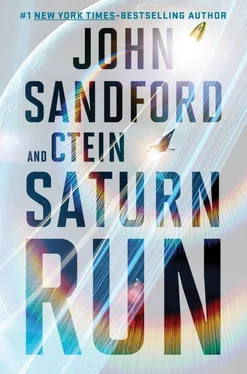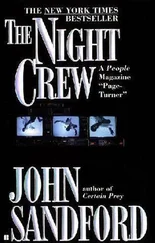Becca had spent the day supervising the first controlled shutdown of the Nixon ’s propulsion system since they’d left Earth’s orbit. Shutting down was less dangerous than start-up, but not a whole lot less tricky. Strictly speaking, it was unnecessary. The thrust of the four VASIMRs was low enough that firing broadside for a few hours would hardly affect their trajectory. But the techies running the simulations were antsy about those sail ribbons running at full velocity. The sims said they’d be fine in a rotating reference frame, but better to err on the side of caution and slow that molten metal down as much as they could.
Engineering had to ramp down the output of the reactor, turbines, and generators while shutting down the VASIMR engines and slowly winding down the radiator system. Not too fast or the system would overheat; not too slowly or the heat exchangers would freeze up.
The shutdown wasn’t complete. Becca didn’t want to restart the radiator system from scratch; cold starts were always rough. Happily, there was no need to. The reactors could churn out power indefinitely, and she’d had them wound down to the point where they’d be supporting the radiators at minimum output. She could bypass the main turbines and generators entirely, run the auxiliary power system—more than enough to maintain ship’s power and the heater and control systems for the heat exchangers and radiators—and toss in a bit extra to give the molten metal ribbons something to do as they cycled from nozzle to collection boom and back down into the heat exchangers.
The process wasn’t all that difficult and they’d practiced it in Earth orbit. This wasn’t for practice, though, and there were no rescue ships if something went wrong.
It all went smoothly, though, and the Nixon went into free fall.
At that point, the attitude thrusters went to work, a complex and delicate orchestration of impulses that slowly rotated the entire structure—booms, struts, axles, and modules—a hundred and eighty degrees, so the engines were pointing away from the sun, and what had been the forward part of the ship was now facing back the way they came.
The crew wasn’t overly worried about impacts on the engines. Their cross-section was small, and they were now well clear of the asteroid belt; in fact they were approaching Jupiter’s orbit. Jupiter, fortunately, was far away. Becca didn’t have to be concerned with the Jovian gravity well or the massive radiation belts. Even Jupiter’s leading and trailing Trojan asteroids were far off: their orbit simply made for a mental benchmark.
The next one would be the rendezvous with Saturn.
On this day, she and her crew would bring the engines back online, essentially, shutdown in reverse. Again, as they’d practiced so many times in Earth orbit, it would be a slow and coordinated ramping up of reactors, turbines, generators, engines, while bringing the radiator system up to full speed.
If everything went as planned, they’d be at Saturn in a little over three months. Things had been going smoothly since the shutdown of Reactor 2. Both the flyby of the sun and the transit of the asteroid belt had been as uneventful as statistics had predicted, given good engineering.
The shutdown of Reactor 2 still nagged at her. If she’d been able to keep both reactors up and running, they’d be looking at a Saturn arrival in a little over a month and a half, instead of three months away. They weren’t in any danger of losing the race to the Chinese—they’d already made up for the nine-month launch lead the Celestial Odyssey had, which was now only a little farther from the sun than the Nixon . The Chinese ship was coasting along at less than twenty kilometers per second, even after its unexpected midcourse boost. The Nixon was speeding away from the sun at more than a hundred and seventy kilometers per second. They’d get to Saturn with months to spare.
But still… Reactor 2 nagged.
As the cart approached the service egg bay, her mind turned back to the day’s itinerary. This was perhaps the most critical point in the ship’s journey; now they had to start decelerating or they were all on a one-way trip to some not-very-nearby star. Ironically, the loss of Reactor 2 actually made her job easier. They only had half as much power to manage and they still had close to full capacity on the radiators, so nothing there was being pushed to its limits.
Doing it right required paying attention to detail, but it was the kind of power plant operations work that made her the most comfortable—the boring kind. Take it up five percent. Check all the settings. Double-check the settings. Take it up another five percent. Check the settings. Double-check the settings. Rinse and repeat until done.
She didn’t even need to be in the engine room for this one, so she was going to be keeping an eye on the performance of the radiators from outside. Sometimes you picked up on stuff just watching the equipment run that you didn’t get from the instrument readings. Sandy would accompany her so she could get a hard copy record of whatever she saw and take advantage of his multispectral cameras and extensive range of optics. Whatever she found worth recording he’d capture six ways to Sunday, and she’d review it at her leisure.
____
When she arrived at the service bay, Sandy had finished loading his camera gear into his egg and was chatting with Joe Martinez. Martinez had his slate plugged into Sandy’s egg, checking out all the relevant preflight specs.
“Morning, Joe,” she said, as the transport stopped and she pushed herself off, got her feet stuck to the floor.
“Becca… already checked you out, you’re good.” He touched his slate and said to Sandy, “And you’re good, too.”
“I already knew that, having done exactly what you just did,” Sandy said.
Martinez shut down his slate and said, “Two heads are better than one, especially… I say, especially… when one of them is yours. That problem doesn’t come up with Becca, of course.”
Becca yawned: “I gotta pee before I go out.”
Sandy: “You haven’t already?”
“Yeah, but I had two more bulbs of coffee since then and I could really use another.” She handed Sandy a sack: “Peanut butter sandwiches and a bag of cookies. We might be out for a while.”
“Hmm. Junk food. My body is my temple. Do I want to stick sugar and fat into it?”
“You might, if we have a problem, and wind up being outside for five or six hours.”
“Good point.” He stuck the sack in a plastic box next to the egg’s pilot seat.
Becca yawned again and said, “You guys are playing tonight, right?”
“Seven o’clock. We’ve got three new covers of Eye-Shine songs, so you’ll probably want to be there.”
“I can hardly wait.” She wandered off to the restroom and was back three minutes later. “Let’s get out there and get it done. Wendy’s ready to push the button. Sandy, you got the macro on?”
“I do.”
“Let’s go, then.”
“Have fun, you kids,” Martinez said. “Don’t stay out too late.”
____
The next two hours were carefully choreographed, a virtual textbook exercise, and thoroughly documented. It wasn’t as bad as the cold starts had been in Earth orbit. The radiator ribbons were still moving, the reactors were simmering along at ten percent output, and the heat exchangers and sodium boilers were primed and simmering, like a stove set on very low.
Becca was in frequent contact with Greenberg as they worked through it, and she and Sandy cruised the radiator mechanicals as they worked toward full speed. Becca pointed Sandy at a couple of items she’d wanted documented: the exact way the edge of the molten ribbon flowed from the outer end of the slot nozzle, some details of how the ribbons got collected and shunted down the masts.
Читать дальше








